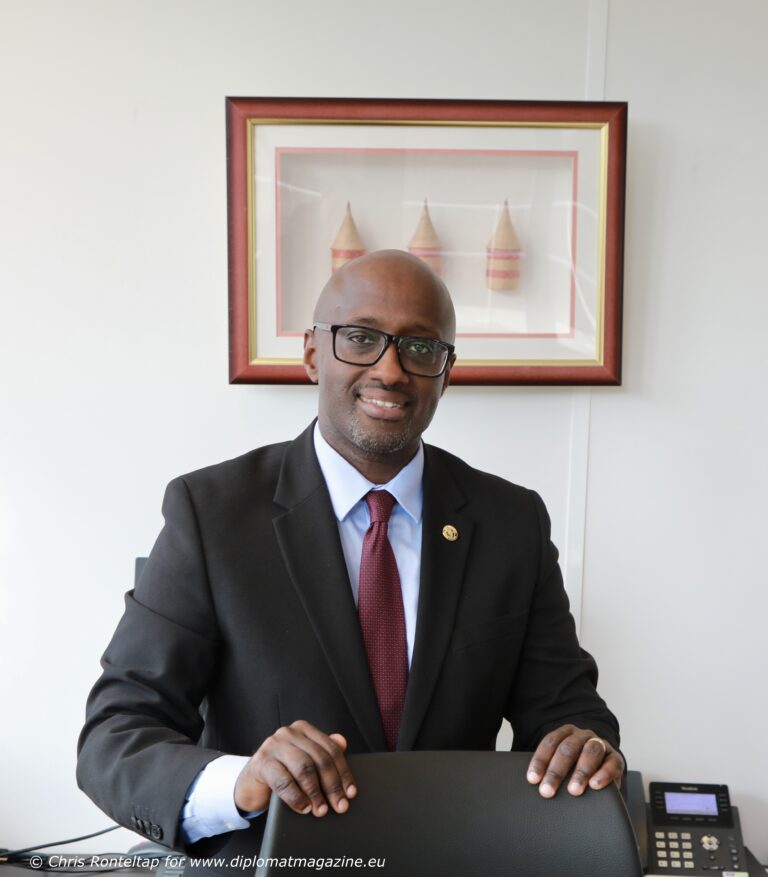By Roy Lie Atjam
The Hague, Saturday 15 June 2024 Diplomat Magazine organized its IX Diplomats Biking Spree an annual biking tour for diplomats – a few days on the heels of World Bicycle Day, 3rd June. June 3, is the day the United Nations celebrates the World Bicycle Day, formally adopted in 2018. The theme for the 2024 World Bicycle Day is, “Your Pedal, Your Health, Your Nature”!
The Turkmenistan Permanent Mission to the United Nations-sponsored the adoption of World Bicycle Day. Through their stewardship, 193 member states reached a consensus to sign the resolution. World Bicycle Day aims to spread awareness about the benefits of cycling. People are urged to use the cycle as a mode of transportation enabling a sustainable way of living.


The phenomenon of ambassadors, diplomats, and international representatives touring The Hague by bike is not new, as this is already the ninth year for the Diplomats Biking Spree. On Saturday 15 June 2024, Diplomat Magazine organized its ninth annual biking tour in The Hague.
The route spanned approximately 14 km and featured several highlights, including the statue of George Maduro at the George Maduroplein, the roundabout Scheveningen, Pompstationsweg, the clock at Waalsdorpervlakte, the Watertoren pompstationsweg, the Nationaal monument Oranje-hotel and De Tapuit, info center of the water authority Dunea.

The route in the Scheveningen dunes had some hilly sections that required cyclists to do some climbing. Overall, it was a very enjoyable tour for all participants. Cyclists either brought their own bikes or rented a complimentary one from Gazelle.


The tour was attended by enthusiastic cyclists from the embassies of Argentina, Bolivia, Burundi, Chile, Colombia, Costa Rica, Cuba, the Dominican Republic, Guatemala, India, Indonesia, Iran, Korea, Malta, Malaysia, Pakistan, Romania, the USA, Thailand, the Philippines, Singapore, Sudan, Uruguay, Venezuela and other countries.
This year, a different format was adopted for the opening of the tour program. The event started with a walk-in at Leonardo Royal Hotel The Hague, where participants enjoyed coffee and light refreshments.

Dr. Mayelinne De Lara, Diplomat Magazine’s Publisher and Skadi Tirpak, the director of the Dutch Cycling Embassy, delivered the welcome speeches.


A short speech was also given by Danielle van Mulukom, Head of International Enterprise at Ministry of Foreign Affairs. During her presentation, she shared some statistics and emphasized that the tour not only highlights the joy of cycling as a means of bringing people together but also underscores its role in promoting sustainable economic growth and improving the quality of life. Van Mulukom continued by stating that cycling holds significant economic potential for the Netherlands, which explains her role as the head of the International Enterprise Department of the Ministry of Foreign Affairs in the Netherlands.
She expressed excitement about having everyone present and looked forward to a day filled with camaraderie, shared experiences, and the strengthening of international bonds through the simple yet powerful act of cycling.
There was also a warm welcome from Deputy Mayor Arjen Kapteijns, who is The Hague’s alderman for the Energy Transition, Mobility, Raw Materials, and the Centrum city district. His involvement highlights the city’s commitment to advancing mobility and sustainable practices.
“The Hague has been actively supporting initiatives to improve mobility and encourage the use of bicycles. The city’s comprehensive traffic control system efficiently coordinates cars, bikes, trams, buses, and pedestrians. Moreover, we are expanding biking programs designed to assist families in buying bikes for their children, encouraging a culture of cycling from a young age.”
The presentation and Q&A session titled “Cycling in The Netherlands: development, lessons learnt, and pedalling – with everybody – beyond our borders” was conducted by Emma Stubbe from the DCE. Introductions of experts, guides, and bike suppliers were made, along with safety hints and cycling tips.


The Hague and its surrounding areas are ideal for biking, with lush green cycling paths. The Hague is possibly Europe’s greenest city. It’s important to learn the dos and don’ts of cycling in the city, especially taking into account the phenomenon of tram rails.


One ambassador once observed that it was good to be with fellow diplomats and ambassadors while biking. He highly recommended biking during their tenure in The Hague.
Up to the jubilee, tenth annual biking tour in 2025.




















